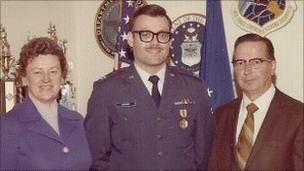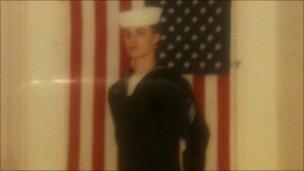Don't Ask Don't Tell repeal: American reaction
- Published
US President Barack Obama has signed landmark legislation allowing openly gay people to serve in the military.
It came after the Senate and House of Representatives both approved the repeal of the "don't ask, don't tell" law, which bars gay people in the military from revealing their sexual orientation.
Here, BBC News website readers who have served in the US Military give their reaction to the decision.
Bruce Hogman says the military will adapt

I welcome this move by the government, having served honourably as both enlisted and commissioned officer in the US Air Force with decorations for service.
If we look at the history of the US military, we find that President Truman's order ending racial segregation in the US Armed Forces in 1947 was met with very similar objections from the senior military leaders and politicians of that time. They warned of loss of unit cohesion and effectiveness, ignoring the outstanding service of black and Japanese segregated units in World War II. Those predictions will again prove false today with the end of gay discrimination.
Having been a gay man serving as a Captain in the Air Force I don't think it will make a difference, they're not all going to come out en masse. For those homosexuals serving now, it removes the fear of having to come out for career advancement which requires a higher level of security clearance.
The military will again behave as military have in the past and perform with good form and let nothing distract them from their military duties.
Whereas before it couldn't educate troops about homosexuality and things like STIs now, because it is legal, they will have to address them properly. When I enlisted we were told lots about things like female prostitutes but nothing about gay life.
It will also allow the military to set proper ground rules on things like fraternization. When I was in Washington they would simply put gay bars off limits which made them even more appealing. Instead of creeping around very discretely, now a simple 'no' will suffice.
Instructors and educators will have to learn about gay life and how to explain it to the recruits rather than, as they did, simply ignore it because it was illegal. I hope they succeed.
Gary Parsons thinks the change will be detrimental
I hope I am wrong because, my belief is that this lift of the ban will be detrimental. I served four years in the military. The problem is not with the gays, but with the homophobic, including those that are not homophobic but might be uncomfortable in close quarters.
I'd have felt uncomfortable knowing there were homosexual guys even though I know it's such a shallow thing to think. But people who are homophobic are really irrational and just have this hate for gay people, like they want to be violent towards them.
My fear is that all it takes is for a few instances where homophobic men become uncomfortable and violent towards someone they perceive as gay. It could be used as a "he just came onto me so I hit him" excuse to justify violence and to ostracise. There are heterosexual men I served with who struggle to comprehend homosexuality.
With the size of our force, there's going to be a few homophobes in the ranks and it only takes a few instances for it to create a massive issue for the authorities.
I seldom agree with Senator McCain but given the issues we're confronting in public life - like in California where they've voted down gay marriage - perhaps addressing it in military life is still a step too far, especially at a time of war.
Bobby Davis was discharged under the policy
The repeal of "Don't Ask, Don't Tell" is a victory for me, the gay community and for equality in the United States of America. Repealing this disgustingly archaic law has finally given way to the promises and core values of our founding fathers to "form a more perfect union" and for "freedom and justice for all."

My career as a future Officer in the United States Navy was taken away from me because of the policy. I enlisted as a Petty Officer and had got a scholarship to join the Officer Training program. I was being harassed because some of the guys perceived me as being gay. Because we were always told to put personal integrity and truth first I couldn't lie to my commanding officer. The change means that I would have been protected had it happened to me now.
I was discharged from the US Navy because of the policy. It literally says in my discharge papers "discharged due to homosexuality and convenience of the government." I was devastated. I always wanted to be a Naval Officer ever since I saw the movie Top Gun.
There's no reason it will affect combat readiness, as some have claimed. When you're in uniform, you're professional and keep the personal to a minimum. No one wanders round telling everyone they're heterosexual, so there's no reason for homosexuals to do so.
It's a significant moment for the US as finally people are allowed to be who they are. It's awful that we're only just doing this now.